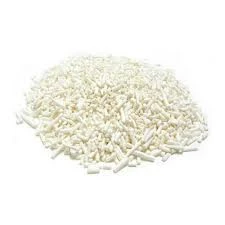
Harmful Food Additives to Avoid for a Healthier Diet
Understanding Dangerous Food Additives
In today's fast-paced society, convenience foods and processed items are omnipresent. They promise time-saving meal solutions and exciting flavors; however, lurking within these appealing packages often are food additives that could pose significant health risks. Understanding these dangerous food additives is essential for maintaining a healthy lifestyle and making informed dietary choices.
Food additives serve various purposes, including preservation, flavor enhancement, and color augmentation. While some additives are deemed safe and even beneficial, others can lead to serious health concerns. One of the most notorious groups of harmful additives includes artificial sweeteners, particularly aspartame and saccharin. While marketed as healthy alternatives to sugar, studies have linked excessive consumption of these sweeteners to potential metabolic issues, headaches, and even an increased risk of certain cancers. Consumers should be cautious of products proudly labeled as sugar-free, as they often contain these controversial ingredients.
Another area of concern is artificial colors, commonly found in candies, cereals, and soft drinks. Ingredients like Red 40 and Yellow 5 can enhance visual appeal but have been associated with negative health effects such as hyperactivity in children and potential carcinogenic properties. In recent years, more parents and health-conscious consumers have begun to scrutinize food labels, opting for brands that use natural colorants derived from fruits and vegetables instead.
Preservatives such as sodium nitrite and BHA (butylated hydroxyanisole) are also prevalent in processed meats and snacks. These compounds are used to prevent spoilage and prolong shelf life, but research indicates that they may form harmful compounds called nitrosamines when exposed to high temperatures, which are linked to cancer. As a result, many health advocates recommend limiting consumption of processed meats and opting for fresher alternatives whenever possible.
dangerous food additives

Additionally, monosodium glutamate (MSG), a flavor enhancer found in many Asian cuisine alternatives and processed snacks, is commonly misunderstood. While it has been deemed safe by food safety authorities, some individuals report adverse reactions like headaches or allergic symptoms. The debate over MSG has resulted in increased consumer vigilance, encouraging people to seek out products labeled MSG-free or to prepare meals from scratch with fresh ingredients to avoid this additive.
Furthermore, trans fats, which are often found in margarine, fried foods, and baked goods, have been a significant public health concern. These synthetic fats are created through hydrogenation to improve shelf life and texture but have been shown to increase bad cholesterol (LDL) levels while lowering good cholesterol (HDL) levels, ultimately raising the risk of heart disease. Many jurisdictions have implemented bans on trans fats, yet awareness remains vital, as products may still exist that contain these harmful substances.
Beyond additives typically associated with health risks, excessive sodium levels in processed foods contribute to high blood pressure and heart disease. The prevalence of salt in canned soups, snack foods, and frozen meals often goes unnoticed, emphasizing the need for consumers to be vigilant about their sodium intake.
The consequences of prolonged exposure to dangerous food additives can range from mild discomfort to severe health conditions. Therefore, understanding food labels is a critical skill for consumers. Reading the ingredient list allows individuals to make informed choices about what they put into their bodies. In addition to basic awareness, promoting whole foods, cooking from scratch, and utilizing fresh ingredients are ideal ways to avoid harmful additives while also reaping the benefits of a nutritious diet rich in vitamins and minerals.
In conclusion, while food additives can enhance the appeal and shelf life of many products, it is crucial to remain aware of the potential risks associated with certain additives. By educating ourselves about these substances, we can make better dietary decisions, ultimately leading to improved health and wellness. Choosing whole, minimally processed foods, paying close attention to ingredient lists, and being cautious about the regular consumption of processed items can empower individuals to take control of their health in today’s complex food landscape.
-
Buy High-Quality Trichloroisocyanuric Acid for Sale | TCCA 90% SupplierNewsAug.30,2025
-
Pure Sodium Dichloroisocyanurate Dihydrate | Powerful DisinfectantNewsAug.29,2025
-
Industrial Chemicals: Quality & Purity for Every IndustryNewsAug.28,2025
-
Nitrile Rubber Honoring Strict Production StandardsNewsAug.22,2025
-
Aspartame Ingredients Honoring Food Safety ValuesNewsAug.22,2025
-
Fertilizer for Balanced Plant NutritionNewsAug.22,2025
-
Cyanide Gold Processing with High Purity AdditivesNewsAug.22,2025
Hebei Tenger Chemical Technology Co., Ltd. focuses on the chemical industry and is committed to the export service of chemical raw materials.
-

view more DiethanolisopropanolamineIn the ever-growing field of chemical solutions, diethanolisopropanolamine (DEIPA) stands out as a versatile and important compound. Due to its unique chemical structure and properties, DEIPA is of interest to various industries including construction, personal care, and agriculture. -

view more TriisopropanolamineTriisopropanolamine (TIPA) alkanol amine substance, is a kind of alcohol amine compound with amino and alcohol hydroxyl, and because of its molecules contains both amino and hydroxyl. -

view more Tetramethyl Thiuram DisulfideTetramethyl thiuram disulfide, also known as TMTD, is a white to light-yellow powder with a distinct sulfur-like odor. It is soluble in organic solvents such as benzene, acetone, and ethyl acetate, making it highly versatile for use in different formulations. TMTD is known for its excellent vulcanization acceleration properties, which makes it a key ingredient in the production of rubber products. Additionally, it acts as an effective fungicide and bactericide, making it valuable in agricultural applications. Its high purity and stability ensure consistent performance, making it a preferred choice for manufacturers across various industries.





